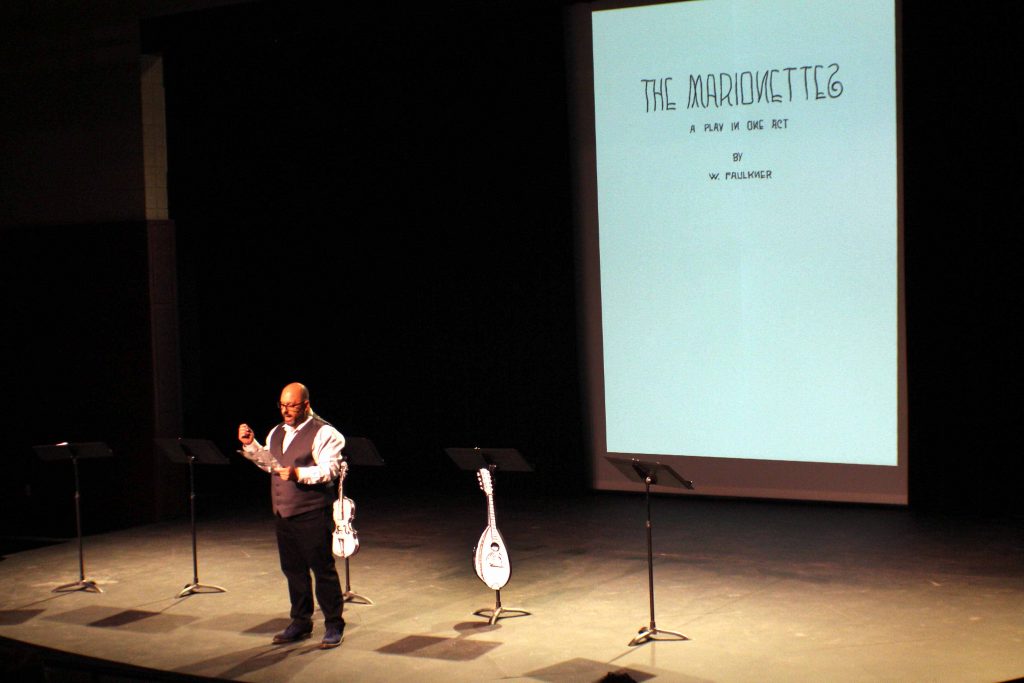Six actors dressed in black stood side by side, alone on the stage except for the music stands in front of them, two of which were adorned by black-and-white paintings of a mandolin and a violin. Otherworldly music flowed around them, and behind them, William Faulkner’s original sketches illustrated for the audience the flowery, metaphor-dense script the actors read.
Ole Miss Theatre and Film hosted this staged reading of Faulkner’s short play “The Marionettes” on Monday in Meek Auditorium. Since the play was first published commercially in 1975 and had never even been transcribed from Faulkner’s handwritten original, this was potentially the first onstage portrayal since the play was first written in the early 1920s when Faulkner was part of the Ole Miss theatre group of the same name.

Ole Miss Theatre and Film host a staged reading of William Faulkner’s play “The Marionettes” on Monday in the Meek auditorium. Photo by Reed Jones
The little-known play is a glimpse into Faulkner’s artistic journey before he became a Nobel Prize-winning author.
“There’s an obvious love affair with language there, and there’s a very young artist who hasn’t necessarily found the right place to ground it yet,” said Jay Watson, Howry Chair of Faulkner Studies.
Despite the heavy-handed language, “The Marionettes” tells a simple story, which Jared Spears narrated. Claire Porter was dynamic and moving as Marietta, a young woman who is seduced and whisked away by the singing voice of The Shade of Pierrot, a playful spirit read by Christian Carew, who eventually leaves her. She returns to her garden as Autumn arrives. Gunnar Ohberg read as the Spirit of Autumn, who laments the fleeting nature of life and beauty and the inevitability of death.
The thickest metaphors come from the Grey and Lilac figures, who provide an ornate commentary as the events unfold. Ryan Medina and Sydney Hanson delivered these extravagant visual images as they humorously one-upped each other.
“Reading it on the page, I hadn’t picked up that tongue-in-cheek quality,” Watson said. “That became much clearer to me hearing it than it had been just contemplating it silently.”
In the discussion after the reading, director Peter Wood embraced this humorous interpretation, saying that “there is a sense where (Faulkner is) not taking himself too seriously. He was writing this for friends of his.”
Watson, however, was not as sure.
“A lot of what we know about Faulkner at this time in his life is that he took himself very seriously,” Watson said.
Wood, also the production’s sound designer, said he emphasized the ethereal language through his music choices and decision to display Faulkner’s Art Deco sketches.
“It had that otherworldly kind of weirdness that I wanted to bring before the play even started,” he said.
Audience members had mixed reactions to the text. Laurel Peek, a senior English and Spanish double major and student in Watson’s class on Faulkner, enjoyed the actors’ interpretation but not the play itself.
“I thought is was very self-important and heavy-handed,” Peek said. “But I think, in a way, he was kind of making fun of himself or pushing the boundaries. I’m inclined to hope that it was an intentional drama.”

Ole Miss Theatre and Film host a staged reading of William Faulkner’s play “The Marionettes” on Monday in the Meek auditorium. Photo by Reed Jones
Other viewers enjoyed the florid language and otherworldly atmosphere.
Senior Arabic and international studies double major Cynthia Bauer said she thought that play “was really kind of fantastical and … wispy, willowy.”
“I don’t know if I was reading my nihilism into it, but there was really a dark undertone,” Bauer said. “I thought it was really multi-layered and fun.”
Ole Miss Theatre and Film’s next production, “Assassins,” will run Nov. 9 to 11 in Fulton Chapel.






